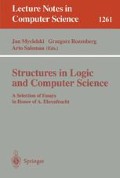Abstract
When Ehrenfeucht introduced his game theoretic characterization of elementary equivalence in 1961, the first application of these “Ehrenfeucht games” was to show that certain ordinals (considered as orderings) are indistinguishable in first-order logic and weak monadic second-order logic. Here we review Shelah's extension of the method, the “composition of monadic theories”, explain it in the example of the monadic theory of the ordinal ordering (ω, <), and compare it with the automata theoretic approach due to Büchi. We also consider the expansion of ordinals by recursive unary predicates (which gives “recursive ordinal words”). It is shown that the monadic theory of a recursive ω n-word belongs to the 2n-th level of the arithmetical hierarchy, and that in general this bound cannot be improved.
Preview
Unable to display preview. Download preview PDF.
References
J.R. Büchi, On a decision method in restricted second order arithmetic, in: Logic, Methodology and Philosophy of Science, Proc. 1960 Intern. Congr. (E. Nagel et al. Eds.), Stanford Univ. Press 1962, pp. 1–11.
J.R. Büchi, Decision methods in the theory of ordinals, Bull. of the Amer. Math. Soc 71, (1965), 767–770.
J.R. Büchi, State-strategies for games in G σδ, J. Symb. Logic 48 (1983), 1171–1198.
E. M. Clarke, N. Francez, Y. Gurevich, P. Sistla, Can message buffers be characterized in linear temporal logic?, Symp. on Principles of Distributed Computing, ACM 1982, 148–156.
C.C. Chang, H.J. Keisler, Model Theory, North-Holland, Amsterdam 1973.
H.D. Ebbinghaus, J. Flum, W. Thomas, Mathematical Logic, 2nd Edition, Springer-Verlag, New York 1993.
H.D. Ebbinghaus, J. Flum, Finite Model Theory, Springer, New York 1995.
A. Ehrenfeucht, Decidability of the theory of the linear ordering relation, Notices of the A.M.S. 6 (1959), 268.
A. Ehrenfeucht, An application of games to the completeness problem for formalized theories, Fund. Math. 44, 241–248.
S. Feferman, R.L. Vaught, The first order properties of algebraic systems, Fund. Math. 47 (1959), 57–103.
R. Fraïssé, Sur quelques classifications des systémes de relations, Publ. Sci. Univ. Alger Sér. A 1 (1954), 35–182.
Y. Gurevich, Modest theory of short chains I, J. Symb. Logic 44 (1979), 481–490.
Y. Gurevich, Crumbly spaces, in: Sixth Intern. Congr. for Logic, Methodology, and Philosophy of Science (1979), North-Holland, Amsterdam 1982, pp. 179–191.
Y. Gurevich, Monadic second-order theories, in: Model-Theoretic Logics (J. Barwise, S. Feferman, Eds.), Springer-Verlag, Berlin-Heidelberg-New York 1985, pp. 479–506.
Y. Gurevich, M. Magidor, S. Shelah, The monadic theory of ω 2, J. Symb. Logic 48 (1983), 387–398.
Y. Gurevich, S. Shelah, Modest theory of short chains II, J. Symb. Logic 44 (1979), 491–502.
Y. Gurevich, S. Shelah, Rabin's uniformization problem, J. Symb. Logic 48 (1983), 1105–1119.
Y. Gurevich, S. Shelah, The decision problem for branching time logic, J. Symb. Logic, 50 (1985), 668–681.
J. Hintikka, Distributive normal forms in the calculus of predicates, Acta Philos. Fennica 6 (1953).
G. Kreisel, J. Shoenfield, H. Wang, Number theoretic concepts and recursive well-orderings, Archiv für Mathematische Logik und Grundlagenforschung 5 (1960), 42–64.
H. Läuchli, A decision procedure for the weak second order theory of linear order, in: Contributions to Mathematical Logic, Proc. Logic Colloquium Hannover 1966, North-Holland, Amsterdam 1968.
R. Ladner, Application of model theoretic games to discrete linear orders and finite automata, Inf. Contr. 33 (1977), 281–303.
F. Moller, G. Birtwistle (Eds.), Logics for Concurrency, Springer Lecture Notes in Computer Science, Vol. 1043, Springer-Verlag, Berlin 1996.
P. Odifreddi, Classical Recursion Theory, Noth-Holland, Amsterdam 1989.
F.P. Ramsey, On a problem of formal logic, Proc. London Math. Soc. 30 (1929), 264–286.
H. Rogers, Theory of Recursive Functions and Effective Computability, McGraw-Hill, New York 1967.
S. Shelah, The monadic theory of order, Ann. Math. 102 (1975), 379–419.
W. Thomas, The theory of successor with an extra predicate, Math. Ann. 237 (1978), 121–132.
W. Thomas, On the bounded monadic theory of well-ordered structures, J. Symb. Logic 45 (1980), 334–338.
W. Thomas, A combinatorial approach to the theory of ω-automata, Inform. Contr. 48 (1979), 261–283.
W. Thomas, Automata on infinite objects, in: Handbook on Theoretical Computer Science, Vol. A (J. v. Leeuwen, ed.), Elsevier, Amsterdam 1990.
R.S. Zeitman, The Composition Method, PhD Dissertation, Wayne State Univ., Michigan, 1994.
Author information
Authors and Affiliations
Editor information
Rights and permissions
Copyright information
© 1997 Springer-Verlag Berlin Heidelberg
About this chapter
Cite this chapter
Thomas, W. (1997). Ehrenfeucht games, the composition method, and the monadic theory of ordinal words. In: Mycielski, J., Rozenberg, G., Salomaa, A. (eds) Structures in Logic and Computer Science. Lecture Notes in Computer Science, vol 1261. Springer, Berlin, Heidelberg. https://doi.org/10.1007/3-540-63246-8_8
Download citation
DOI: https://doi.org/10.1007/3-540-63246-8_8
Published:
Publisher Name: Springer, Berlin, Heidelberg
Print ISBN: 978-3-540-63246-7
Online ISBN: 978-3-540-69242-3
eBook Packages: Springer Book Archive

